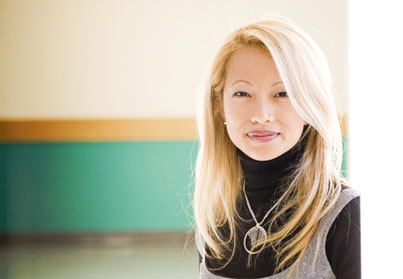The pain women don't talk about: Breaking taboos to find answers
The pain women don't talk about: Breaking taboos to find answers McGill University
User Tools (skip):
The pain women don't talk about: Breaking taboos to find answers

For PhD psychology student Alina Kao, finding women to participate in a study on post-menopausal pain has been a struggle and a point of pride.
In four decades of research, Irv Binik has never had this much trouble finding subjects for a study. For more than a year, the psychology professor and his PhD student, Alina Kao, have been trying to gather enough subjects to conduct a study on post-menopausal genital pain. They've found only 40 women — fewer than half the usual number of respondents.
"The problem is the age range and the fact that women believe that menopause means the end of their sex life and that there is nothing they can do about it. I don't think any of that is true or at least we're going to find out if it is," said Binik, who has been conducting research on human sexuality since 1970 and who founded and directs the Sex and Couple Therapy Service of Royal Victoria Hospital, which is part of the McGill University Health Centre (MUHC).
Binik and Kao must study at least 200 women between 45 and 65 years old to reach conclusive findings that could help the estimated 15 percent of post-menopausal women suffering from this kind of pain, called dyspareunia. For some women, the pain is constant and not triggered by intercourse — it can occur in non-sexual settings or without any obvious cause.
In 1994, Binik's team had no problem finding enough participants for a comprehensive study on pre-menopausal dyspareunia. Their groundbreaking work resulted in the first true understanding of the disorder in younger women and re-classified dyspareunia from a catchall description for what was mistakenly thought to be a general category of pain to different kinds of pain with several options for relief.
They hope to bring similar understanding and help to older women but they face several obstacles, including what they believe to be a mistaken emphasis on menopause as the only cause.
"One tends to attribute too much to menopause," Binik lamented. "There are many different causes of pain pre-menopausally and it doesn't make sense that that wouldn't be the case post-menopausally as well. I'm not denying that menopause plays a role for the pain experienced by some women, but saying that it's only caused by menopause is too simplistic an answer."
Breaking through the barriers
There is the additional problem of convincing women in the largely over-60 demographic of the right to their own sexuality. Taboos from the 1950s, when many of them came of age, remain an inhibiting factor. "Some of the women cry, they're so relieved to finally be talking about this," Kao said. "For many, this is the first time that they're finally discussing this problem."
Starting this month, the study will be conducted at a second site — out of CHU Sainte-Justine's Gynecology Department —as well as Binik's lab in the Stewart Biology Building.
Participants are given $50 for about three hours of their time, during which staff take a thorough medical history and administer a pain-threshold test, in which women's upper arms and genitals are touched with an ear swab. They must also fill out a questionnaire at home. One of the benefits of participating in the study is a free gynecological exam by a world dyspareunia expert, the MUHC's Dr. Samir Khalifé.
Kao said, "The recruitment has been a challenge but the toughest part personally is hearing from women who have been in pain for years. Sometimes when women muster up the courage to talk to their doctor, it's either not addressed or I hear a lot of women tell me that they're told, 'You don't have to worry about that at your age, dear.' That makes me angry and it also makes me really want to work hard at getting the answers and the proper information."
Binik agreed. "It's turning out to be very challenging," he said of the study, "but we're determined to find the answers."
To participate in the study, women should contact Christina Yager at 514-398-5323. For more information, see www.binik-lab.com and www.sexandcoupletherapy.com.

